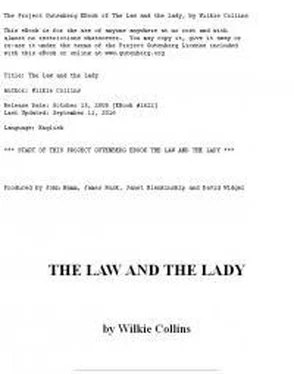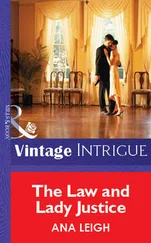Уилки Коллинз - The Law and the Lady
Здесь есть возможность читать онлайн «Уилки Коллинз - The Law and the Lady» весь текст электронной книги совершенно бесплатно (целиком полную версию без сокращений). В некоторых случаях можно слушать аудио, скачать через торрент в формате fb2 и присутствует краткое содержание. Год выпуска: 1999, Жанр: Классическая проза, на английском языке. Описание произведения, (предисловие) а так же отзывы посетителей доступны на портале библиотеки ЛибКат.
- Название:The Law and the Lady
- Автор:
- Жанр:
- Год:1999
- ISBN:нет данных
- Рейтинг книги:5 / 5. Голосов: 1
-
Избранное:Добавить в избранное
- Отзывы:
-
Ваша оценка:
- 100
- 1
- 2
- 3
- 4
- 5
The Law and the Lady: краткое содержание, описание и аннотация
Предлагаем к чтению аннотацию, описание, краткое содержание или предисловие (зависит от того, что написал сам автор книги «The Law and the Lady»). Если вы не нашли необходимую информацию о книге — напишите в комментариях, мы постараемся отыскать её.
The Law and the Lady — читать онлайн бесплатно полную книгу (весь текст) целиком
Ниже представлен текст книги, разбитый по страницам. Система сохранения места последней прочитанной страницы, позволяет с удобством читать онлайн бесплатно книгу «The Law and the Lady», без необходимости каждый раз заново искать на чём Вы остановились. Поставьте закладку, и сможете в любой момент перейти на страницу, на которой закончили чтение.
Интервал:
Закладка:
This, naturally enough, took me completely by surprise. I waited eagerly to hear why we were to send to America.
“It rests with you,” he proceeded, “when you hear what I have to tell you, to say whether you will go to the expense of sending a man to New York, or not. I can find the right man for the purpose; and I estimate the expense (including a telegram)—”
“Never mind the expense!” I interposed, losing all patience with the eminently Scotch view of the case which put my purse in the first place of importance. “I don’t care for the expense; I want to know what you have discovered.”
He smiled. “She doesn’t care for the expense,” he said to himself, pleasantly. “How like a woman!”
I might have retorted, “He thinks of the expense before he thinks of anything else. How like a Scotchman!” As it was, I was too anxious to be witty. I only drummed impatiently with my fingers on the table, and said, “Tell me! tell me!”
He took out the fair copy from Benjamin’s note-book which I had sent to him, and showed me these among Dexter’s closing words: “What about the letter? Burn it now. No fire in the grate. No matches in the box. House topsy-turvy. Servants all gone.”
“Do you really understand what those words mean?” I asked.
“I look back into my own experience,” he answered, “and I understand perfectly what the words mean.”
“And can you make me understand them too?”
“Easily. In those incomprehensible sentences Dexter’s memory has correctly recalled certain facts. I have only to tell you the facts, and you will be as wise as I am. At the time of the Trial, your husband surprised and distressed me by insisting on the instant dismissal of all the household servants at Gleninch. I was instructed to pay them a quarter’s wages in advance, to give them the excellent written characters which their good conduct thoroughly deserved, and to see the house clear of them at an hour’s notice. Eustace’s motive for this summary proceeding was much the same motive which animated his conduct toward you. ‘If I am ever to return to Gleninch,’ he said, ‘I cannot face my honest servants after the infamy of having stood my trial for murder.’ There was his reason. Nothing that I could say to him, poor fellow, shook his resolution. I dismissed the servants accordingly. At an hour’s notice, they quitted the house, leaving their work for the day all undone. The only persons placed in charge of Gleninch were persons who lived on the outskirts of the park—that is to say, the lodge-keeper and his wife and daughter. On the last day of the Trial I instructed the daughter to do her best to make the rooms tidy. She was a good girl enough, but she had no experience as a housemaid: it would never enter her head to lay the bedroom fires ready for lighting, or to replenish the empty match-boxes. Those chance words that dropped from Dexter would, no doubt, exactly describe the state of his room when he returned to Gleninch, with the prisoner and his mother, from Edinburgh. That he tore up the mysterious letter in his bedroom, and (finding no means immediately at hand for burning it) that he threw the fragments into the empty grate, or into the waste-paper basket, seems to be the most reasonable conclusion that we can draw from what we know. In any case, he would not have much time to think about it. Everything was done in a hurry on that day. Eustace and his mother, accompanied by Dexter, left for England the same evening by the night train. I myself locked up the house, and gave the keys to the lodge-keeper. It was understood that he was to look after the preservation of the reception-rooms on the ground-floor; and that his wife and daughter were to perform the same service between them in the rooms upstairs. On receiving your letter, I drove at once to Gleninch to question the old woman on the subject of the bedrooms, and of Dexter’s room especially. She remembered the time when the house was shut up by associating it with the time when she was confined to her bed by an attack of sciatica. She had not crossed the lodge door, she was sure, for at least a week (if not longer after Gleninch had been left in charge of her husband and herself). Whatever was done in the way of keeping the bedrooms aired and tidy during her illness was done by her daughter. She, and she only, must have disposed of any letter which might have been lying about in Dexter’s room. Not a vestige of torn paper, as I can myself certify, is to be discovered in any part of the room now. Where did the girl find the fragments of the letter? and what did she do with them? Those are the questions (if you approve of it) which we must send three thousand miles away to ask—for this sufficient reason, that the lodge-keeper’s daughter was married more than a year since, and that she is settled with her husband in business at New York. It rests with you to decide what is to be done. Don’t let me mislead you with false hopes! Don’t let me tempt you to throw away your money! Even if this woman does remember what she did with the torn paper, the chances, at this distance of time, are enormously against our ever recovering a single morsel of it. Be in no haste to decide. I have my work to do in the city—I can give you the whole day to think it over.”
“Send the man to New York by the next steamer,” I said. “There is my decision, Mr. Playmore, without keeping you waiting for it!”
He shook his head, in grave disapproval of my impetuosity. In my former interview with him we had never once touched on the question of money. I was now, for the first time, to make acquaintance with Mr. Playmore on the purely Scotch side of his character.
“Why, you don’t even know what it will cost you!” he exclaimed, taking out his pocket-book with the air of a man who was equally startled and scandalized. “Wait till I tot it up,” he said, “in English and American money.”
“I can’t wait! I want to make more discoveries!”
He took no notice of my interruption; he went on impenetrably with his calculations.
“The man will go second-class, and will take a return-ticket. Very well. His ticket includes his food; and (being, thank God, a teetotaler) he won’t waste your money in buying liquor on board. Arrived at New York, he will go to a cheap German house, where he will, as I am credibly informed, be boarded and lodged at the rate—”
By this time (my patience being completely worn out) I had taken my check-book from the table-drawer, had signed my name, and had handed the blank check across the table to my legal adviser.
“Fill it in with whatever the man wants,” I said. “And for Heaven’s sake let us get back to Dexter!”
Mr. Playmore fell back in his chair, and lifted his hands and eyes to the ceiling. I was not in the least impressed by that solemn appeal to the unseen powers of arithmetic and money. I insisted positively on being fed with more information.
“Listen to this,” I went on, reading from Benjamin’s notes. “What did Dexter mean when he said, ‘Number Nine, Caldershaws. Ask for Dandie. You shan’t have the Diary. A secret in your ear. The Diary will hang him?’ How came Dexter to know what was in my husband’s Diary? And what does he mean by ‘Number Nine, Caldershaws,’ and the rest of it? Facts again?”
“Facts again!” Mr. Playmore answered, “muddled up together, as you may say—but positive facts for all that. Caldershaws, you must know, is one of the most disreputable districts in Edinburgh. One of my clerks (whom I am in the habit of employing confidentially) volunteered to inquire for ‘Dandie’ at ‘Number Nine.’ It was a ticklish business in every way; and my man wisely took a person with him who was known in the neighborhood. ‘Number Nine’ turned out to be (ostensibly) a shop for the sale of rags and old iron; and ‘Dandie’ was suspected of trading now and then, additionally, as a receiver of stolen goods. Thanks to the influence of his companion, backed by a bank-note (which can be repaid, by the way, out of the fund for the American expenses), my clerk succeeded is making the fellow speak. Not to trouble you with needless details, the result in substance was this: A fortnight or more before the date of Mrs. Eustace’s death, ‘Dandie’ made two keys from wax models supplied to him by a new customer. The mystery observed in the matter by the agent who managed it excited Dandie’s distrust. He had the man privately watched before he delivered the keys; and he ended in discovering that his customer was—Miserrimus Dexter. Wait a little! I have not done yet. Add to this information Dexter’s incomprehensible knowledge of the contents of your husband’s diary, and the product is—that the wax models sent to the old-iron shop in Caldershaws were models taken by theft from the key of the Diary and the key of the table-drawer in which it was kept. I have my own idea of the revelations that are still to come if this matter is properly followed up. Never mind going into that at present. Dexter (I tell you again) is answerable for the late Mrs. Eustace’s death. How he is answerable I believe you are in a fair way of finding out. And, more than that, I say now, what I could not venture to say before—it is a duty toward Justice, as well as a duty toward your husband, to bring the truth to light. As for the difficulties to be encountered, I don’t think they need daunt you. The greatest difficulties give way in the end, when they are attacked by the united alliance of patience resolution— and economy.”
Читать дальшеИнтервал:
Закладка:
Похожие книги на «The Law and the Lady»
Представляем Вашему вниманию похожие книги на «The Law and the Lady» списком для выбора. Мы отобрали схожую по названию и смыслу литературу в надежде предоставить читателям больше вариантов отыскать новые, интересные, ещё непрочитанные произведения.
Обсуждение, отзывы о книге «The Law and the Lady» и просто собственные мнения читателей. Оставьте ваши комментарии, напишите, что Вы думаете о произведении, его смысле или главных героях. Укажите что конкретно понравилось, а что нет, и почему Вы так считаете.












